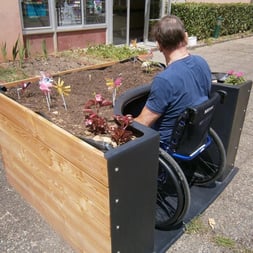What is Hospital Landscaping?
Hospital Landscaping is about making your hospital grounds as pleasing to visitors and staff as possible, from the moment they park their cars, to when they leave after work or after having finished their treatment. It combines hardscape and softscape features to provide a welcoming, calm environment to provide peace of mind at often stressful times as well as giving patients a stimulating and aesthetically pleasing view to help them with their recovery.
Why is it Important?
Hospitals are often stressful environments for patients, their friends and families, and those working in healthcare. Landscaping can be used as a tool to help relax everyone and provide space to enjoy a moment with friends and family. A well-designed hospital landscape will also direct visitors to entrances and exits by using bushes and plant pots and give everyone onsite and fantastic, friendly first impression. Similarly, hanging baskets and trimmed hedgerows can brighten up your entrances to give that calming first impression to those who are worried about their appointments or procedures.
Who Benefits from Hospital Landscaping?

Both healthcare workers and visitors experience a lot of stress in hospitals due to the nature of the work. That’s why everyone benefits from the relaxation and stress relief that healthcare landscaping provides.
Being surrounded by nature and green is proven to lower stress levels and improve mental well-being and has even been proven to reduce recovery time for inpatients. That’s because lowering stress lowers blood pressure and muscle tension, so patients whose rooms have views of plants and trees have a shorter recovery time than those who face parking lots or other buildings.
 Long-term care facilities can even employ Horticultural Therapy techniques, involving engaging patients physically with the garden, from helping them come outside to interact with plants, to bringing gardening boxes into rooms for easy gardening.
Long-term care facilities can even employ Horticultural Therapy techniques, involving engaging patients physically with the garden, from helping them come outside to interact with plants, to bringing gardening boxes into rooms for easy gardening.
While indoor landscaping is effective at improving oxygen levels, outdoor landscaping provides many benefits to staff, as they can find green areas to take a break, enjoy their lunch and unwind with colleagues.
How do you Design a Hospital Landscape?
There are many different landscaping features that can be employed to have an optimal visually stimulating and sensory garden for staff and visitors to engage with and relax in. Here are a few of our suggestions:
Work:
When you arrive at work, what’s the first thing you see? Usually the parking lot, right? So, they should be optimized to impress your guests and be easy to navigate. What’s more, a well-designed parking lot will provide enough shade for most of the cars, as well as be well lit at night for those staff arriving for a night shift or patients who are discharged late. Bear in mind though, that hospital lighting is notoriously bright and hard on the eyes, so consider using yellow light in your outside spaces so those staying overnight aren’t surrounded by bright lights.
 It’s not just staff that have to work in hospitals, but sometimes patients have to work towards their own recovery too. Consider putting steps in your landscape as well as easy-to-use ramps, as many physiotherapy exercises require stair use, especially for those preparing to return to multi-floored homes.
It’s not just staff that have to work in hospitals, but sometimes patients have to work towards their own recovery too. Consider putting steps in your landscape as well as easy-to-use ramps, as many physiotherapy exercises require stair use, especially for those preparing to return to multi-floored homes.
Keep these hardscaping features as safe as possible, however, with handrails all around, stone pathways that are wide enough for a pedestrian to walk alongside a wheelchair, and flat enough that the wheelchairs and IV poles roll smoothly, without being slippery.
Rest:
Lunch breaks are often the only long break a healthcare worker will have in a day so make sure there’s a comfortable area for staff to sit and unwind away from the hectic hospital work. Patients will also appreciate somewhere to sit out to enjoy their lunch, especially on warm summer days to pick up some vitamin D.
Single seats, as well as benches dotted around, will also give staff and patients that much-needed quiet time, while hedges can be used to section off parts and give people some privacy. It’s important that benches are designed specifically for hospitals, however, as they should be comfortable and not too low. You can even add memorial plaques to thank donors or partners.
 Water features can be implemented to mask the general hubbub of hospital life and relax visitors with the gentle sound of trickling water. Herbs also have a relaxing effect; mint, rosemary, roses, and lavender are all pleasing scents, so plant them in pots for visitors to rub their fingers on and enjoy the smells. Lavender is even a natural deterrent against flies and mosquitos so consider placing them near windows and doors. Indoor gardens are great for patients and staff as the plants oxygenate the air and create a peaceful environment. It’s important to avoid flowers that have a lot of pollen as you don’t want to cause sneezing fits. What’s more, strongly scented flowers such as lilies should also be avoided as some patients undergoing chemotherapy are particularly sensitive to them. Indoor plants should ideally be soilless plants to remain pest and disease free and avoid mold.
Water features can be implemented to mask the general hubbub of hospital life and relax visitors with the gentle sound of trickling water. Herbs also have a relaxing effect; mint, rosemary, roses, and lavender are all pleasing scents, so plant them in pots for visitors to rub their fingers on and enjoy the smells. Lavender is even a natural deterrent against flies and mosquitos so consider placing them near windows and doors. Indoor gardens are great for patients and staff as the plants oxygenate the air and create a peaceful environment. It’s important to avoid flowers that have a lot of pollen as you don’t want to cause sneezing fits. What’s more, strongly scented flowers such as lilies should also be avoided as some patients undergoing chemotherapy are particularly sensitive to them. Indoor plants should ideally be soilless plants to remain pest and disease free and avoid mold.
Play:
Your landscape doesn’t have to be huge to have many different features, and one key feature is a play area for children. Either patients or their family and friends will love the chance to play with others, especially in particularly trying times. Just make sure it’s set aside from the main building so any noise won’t disturb other patients wanting rest.
While children obviously like to be engaged with activities, so do your older visitors. Make your landscape as visually stimulating as possible for those who are more immobile or bedbound. Wildflower gardens, bird tables, bird houses, and feeders are all great fun to watch for your guests to take their minds off their appointments. Well-maintained lawns can also benefit as the bright green will relax and calm your hospital goers and the sound of the sprinklers are a nice gentle hum for those looking and listening out.
Big Tip:
The state of your landscape makes a huge difference when considering first impressions. It will either assure visitors or worry them about their upcoming care. The last thing you want to do is scare them, so make sure to maintain your landscape regularly and efficiently to put your visitors' minds at ease.
However, bear in mind that any maintenance that is too noisy, like chopping branches off large trees or mowing huge lawns, will disturb your visitors and staff. Sustainable landscapes require much less maintenance and still look neat and welcoming.
For more information on how to design a sustainable landscape, check out our blog on exactly that.
We can design and develop your hospital landscape!
At Karaoglu, we pride ourselves on our industry expertise and our ability to meet the needs of our clients in a timely manner, and according to budget. We understand the importance of landscaping in the modern world and the challenges each project brings, which is why we have a team of experts ready to make your dream landscape a reality. To learn more about landscape design, check out our article here. Or to read more landscaping tips, check out our resource center here.
![karaoglu-web-footer[7].webp](https://blog.karaoglu.com.tr/hubfs/karaoglu-web-footer%5B7%5D.webp.png)
